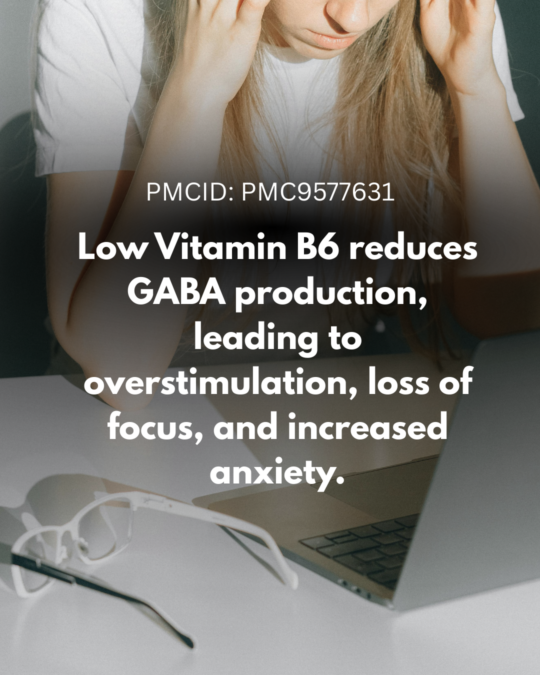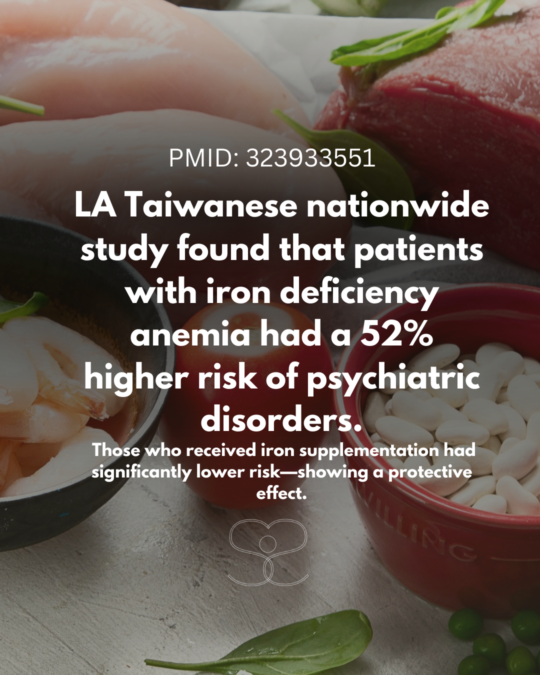Anxiety and Micronutrient Deficiency: A Root-Cause Perspective on Vitamin B6

Author: Dr. Soha Salem, ND
Licensed Naturopathic Doctor | Clinical Psychology Researcher (UCSD)
Anxiety is one of the most prevalent mental health challenges today, affecting millions globally. While conventional treatments such as cognitive-behavioral therapy (CBT) and pharmacologic interventions like benzodiazepines remain standard practice, there is growing interest in the biochemical underpinnings of anxiety—particularly how nutritional status influences brain function. At the intersection of clinical psychology and functional medicine, it becomes essential to ask: Could micronutrient deficiencies, such as Vitamin B6, contribute to the root cause of anxiety?
Understanding the Biochemical Connection
Vitamin B6 (pyridoxine) is a coenzyme involved in over 100 enzymatic reactions, many of which are central to neurotransmitter synthesis and neural regulation. One of its most significant roles is in the production of gamma-aminobutyric acid (GABA), an inhibitory neurotransmitter that calms the nervous system by reducing neural excitability. A deficiency in B6 can therefore disrupt GABA synthesis, contributing to heightened neural activity, restlessness, and symptoms of anxiety.
This mechanistic link was the focus of a double-blind randomized controlled trial published in Human Psychopharmacology (PMCID: PMC9787829), where high-dose B6 supplementation for one month significantly reduced self-reported anxiety and enhanced visual surround suppression, a behavioral measure linked to increased GABAergic activity. Vitamin B12, another key co-factor, showed minor effects, but B6 stood out with a statistically significant impact.
Review of Broader Evidence
Further supporting this connection, a 2022 systematic review and meta-analysis of 18 randomized controlled trials (RCTs) evaluated the effects of B-vitamin supplementation (≥3 B vitamins) on mood. The meta-analysis, involving 2,015 participants, found a significant benefit for stress (SMD = 0.23, p = 0.03) and modest evidence for depressive symptoms. Although the pooled analysis did not reach statistical significance for anxiety (SMD = 0.03, p = 0.71), subgroup analysis showed benefit in “at-risk” populations—those with poor nutrient or mood status.
These findings suggest that nutrient status may moderate clinical outcomes, especially for individuals with pre-existing anxiety or subclinical deficiencies, which are often undiagnosed.
Clinical Implications: Identifying and Addressing Root Causes
As a licensed naturopathic doctor trained in both functional medicine and clinical psychology research, I emphasize identifying root causes rather than simply managing symptoms. Chronic stress, digestive dysfunction, alcohol use, certain medications, and genetic polymorphisms (e.g., in the ALPL or PNPO genes) can deplete B6 stores or impair its activation in the body.
A large cross-sectional study (PMCID: PMC9577631) found that individuals with anxiety and depression had significantly lower dietary intake of B6 than healthy controls. Another Phase IV RCT showed that combining magnesium and B6 supplementation reduced stress and improved physical activity in participants with high stress and low serum magnesium.
Clinical Practice Perspective
In my integrative clinic, when patients present with anxiety, I explore the following:
-
- Comprehensive micronutrient testing, especially B6, B12, magnesium, and folate.
- Functional GI assessment, as impaired absorption may drive deficiencies.
- Dietary analysis, with focus on whole food sources of B vitamins (e.g., legumes, bananas, avocados, sunflower seeds, and leafy greens).
- Individualized supplementation, where clinically indicated and evidence-supported.
- Adjunctive therapies, such as biofeedback, cognitive therapy, and lifestyle interventions, to support neurochemical and psychological resilience.
The Way Forward
While benzodiazepines offer short-term symptom relief, their long-term use is fraught with risks including dependence, cognitive dulling, and discontinuation symptoms. In contrast, nutrient-based interventions, particularly with vitamins like B6, show promise for enhancing mental well-being by restoring the body’s own biochemical balance—with minimal side effects.
That said, it is important to note that B6 is not a stand-alone treatment for anxiety. Its benefits appear modest in the general population but may be clinically meaningful in deficient or at-risk individuals. Future research should continue to explore how targeted nutritional therapies can work synergistically with conventional and naturopathic modalities.
Conclusion
Addressing mental health through a root-cause, integrative lens involves not only assessing psychological and emotional contributors but also the biochemical and nutritional terrain in which the brain operates. Vitamin B6 offers a compelling, evidence-backed tool for clinicians and patients seeking to restore neurochemical balance and support mental wellness—particularly when conventional approaches fall short.
If you suspect that nutrient deficiencies may be contributing to your mental health symptoms, I invite you to consult with a licensed naturopathic doctor for individualized evaluation and care.
CAPTION INS TAGRAM
Is Anxiety Always Psychological—Or Could It Be Biochemical?
A review paper (PMID: 36268413) published in the Journal of PubMed Central (PMC) by the U.S. National Library of Medicine (NLM) explores the impact of high-dose Vitamin B6 on anxiety and depression, highlighting its role in supporting GABA production and neural inhibition.
In my clinical practice, I often see anxiety misattributed solely to psychological stress, when in fact, the root cause may lie in unrecognized biochemical imbalances. In an earlier post, I discussed how iron deficiency is frequently mistaken for a psychiatric diagnosis, despite its direct role in neurotransmitter synthesis and oxygen delivery to the brain.
Similarly, Vitamin B6 deficiency can impair GABA synthesis, leading to heightened neural excitability and persistent anxiety symptoms. When B6 levels are insufficient—due to poor diet, stress, or malabsorption—the body’s ability to maintain emotional balance may be compromised. Both iron and B6 are essential cofactors in the pathways that regulate mood and nervous system function.
This is why I take a whole-person approach to mental health—integrating clinical nutrition, functional lab testing, and personalized naturopathic care to uncover and correct what’s beneath the surface.
— Dr. Soha Salem, ND
Licensed Naturopathic Doctor | UCSD Clinical Psychology Research
This information is educational and not a substitute for medical care. If these symptoms resonate with you, you’re invited to schedule a personalized consultation through my practice.
In fact, a clinical trial (Human Psychopharmacology, PMID: 36268413) showed that high-dose B6 significantly reduced anxiety by boosting GABA activity.

